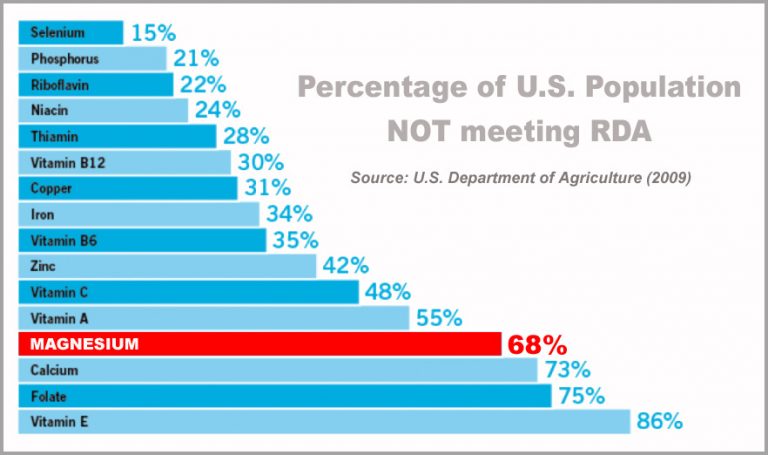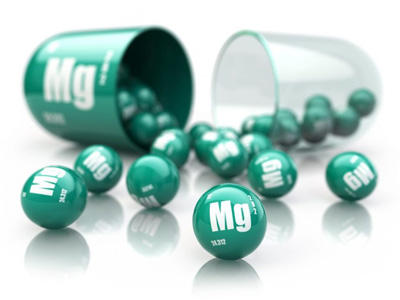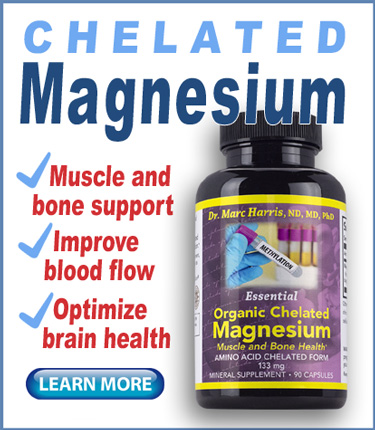Is it necessary to include the mineral magnesium to your daily supplement regimen?
Many nutrient guidelines state that megnesium is one mineral we don’t need to supplement because we get more than enough from our diet; however, many nutritional experts today disagree.
One-hundred years ago it might have been possible to acquire appropriate amounts of magnesium from regular foods. We had rich and fertile soil, ate simple whole foods, and consumed little (if any) processed foods.
But things have changed since then.
Traditional sources of magnesium in decline
Studies show that the magnesium content in common harvested vegetables has declined at a rate of 25-80 percent since the 1950s. And for grains it is even worse: Modern processing techniques remove 80-95 percent of the magnesium!
Whole grains were once a primary source of magnesium and many other essential vitamins and minerals. Down through history many people have been sustained by whole grain bread, which was why the term “bread of life” came into being.
There are three basic reasons for the severe reduction of nutrients in our vegetables and grains:
• Reduced levels of all nutrients in depleted monocultured and chemicalized soil.
• Reduced levels of magnesium due to food processing and gene-altering ingredients.
• Changes in eating habits from primarily staples to primarily processed foods.
On top of all that our bodies rebel against the many factors that interfere with magnesium absorption and bioavailability. These factors include prescription drugs, processed foods, pesticides, age and genetic factors.
Researchers list over-use of processed foods as the primary risk factor that has led to the high levels of magnesium deficiency that exist today.
In addition, stress, lack of sleep, prescription drugs and excessive alcohol consumption exacerbate the problem.
So, is supplementary magnesium necessary? For people who take multiple drugs and eat a lot of processed food, it most certainly is—though they probably don’t know it.
In fact, according to USDA statistics, magnesium deficiency is present in 68% of the U.S. population.
It seems clear that even when people eat an abundance of magnesium-containing foods, they are still borderline deficient. So, for the vast majority of us, supplementing is likely advantageous.
High magnesium foods include dark leafy greens, anything in the broccoli family, beans, nuts, seeds, avocadoes, and fatty wild-caught fish.
Magnesium is the fourth most abundant mineral in the body. Researchers have identified 3,750 magnesium-binding sites on human proteins. Three hundred human enzymes rely on magnesium.
Magnesium stimulates our biochemical processes and functions as an electrolyte, which is crucial for all electrical activity in the body.
Signs of magnesium deficiency
Early signs of magnesium deficiency include “Charlie horses,” muscle spasms when we stretch our legs, headaches or migraines, fatigue, nausea and vomiting.
More chronic deficiency can lead to very serious symptoms such as abnormal heart rhythm, coronary spasms, numbness and tingling, seizures, and changes in personality and behavior.
The bottom line is that it is impossible for our body to function properly without sufficient magnesium, so it is critical to have an appropriate intake—whether from food or supplements.
Be aware that magnesium deficiency cannot be detected by normal blood tests. The magnesium your body needs resides in your bones and organs. Only one percent is in the blood.
Though megnesium deficiency is common today, it clearly doesn’t need to be that way. Both food and supplement sources are readily available. It just takes a little research and planning.
Part of that research should include information on balancing your magnesium intake with calcium, Vitamin D and Vitamin K2. This is advocated by many nutritional experts as the four nutrients work synergeistically.
Magnesium can be found in the following Optimal Health Systems products:
• Essential Magnesium
• Daily Nutrient Essential Pak
• Whole Food Vitamin-Mineral
– – –
Sources include: Ancient-minerals.com, ANH-usa.org, PrecisionNutrition.com.



